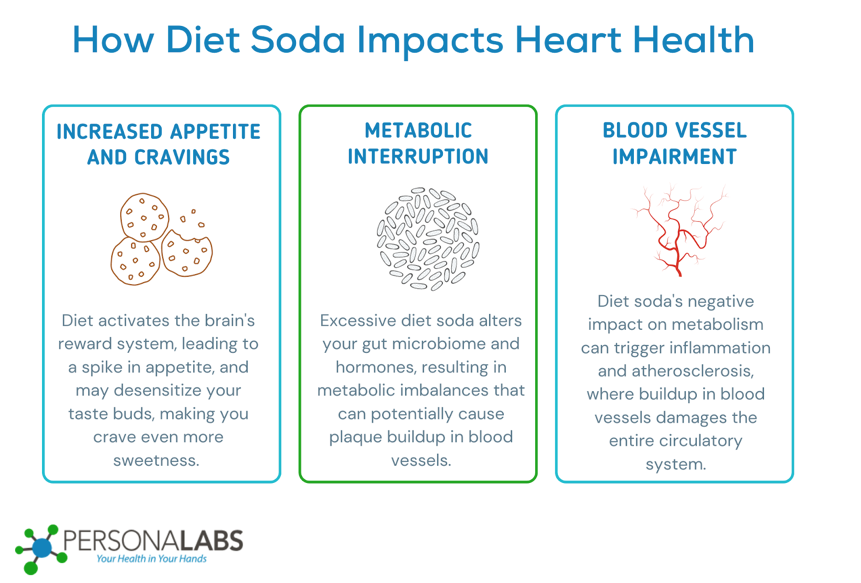- Fast results
- 4,000+ locations
- 4.8 star rating
Need Help? (888) GET LABS


Drinking diet soda does not directly cause cardiovascular problems like stroke, coronary artery disease, heart attack, etc. But that’s not to say this so-called “better alternative” to regular sodas lives up to its name, especially when consumed over twice a day. While diet soda has fewer calories than its regular counterpart, it still contains artificial sweeteners that come with its own set of dangers. Read on to learn the connection between diet soda and heart disease.
| Key TakeawaysDiet sodas trigger sugar cravings and shift the balance in gut health, affecting the ability of the digestive system to absorb nutrients. These changes in the metabolism result in a higher risk of having cardiovascular disease (CVD) through particular health conditions.The adverse impact of frequent diet soda consumption extends to other organ functions as well, like the kidneys, teeth, and gut. Studies show that diet soda, on its own, does not pose any significant health threat. However, its overconsumption can lead to metabolic syndrome. |
The string that binds diet soda and heart disease involves the significant alteration of metabolic processes caused by the overconsumption of the beverage. These metabolic changes take the form of the following conditions that increase your risk of heart disease, which could lead to heart failure.

Diet sodas contain artificial sweeteners, like sucralose, saccharin, and aspartame, which increase one’s appetite, especially for sweet foods. The mechanism follows multiple routes.
For one, the taste of diet soda activates the reward system(1) or “feel-good” part of the brain. The rush of pleasure triggers more cravings, which may push you to consume more.
Your taste buds may also become desensitized as artificial sweeteners in diet sodas tend to be sweeter, although subtler, than regular sugar. This action alters your sense of taste(2). When drinking regularly, you may perceive diet sodas to be less sweet than they actually are, causing you to drink more to satisfy the taste.
The boost in cravings and appetite leads to an increased risk of diabetes and obesity. These health conditions are linked to cardiovascular diseases.
Drinking excessive diet soda can significantly change your metabolism. In fact, it can influence the development of metabolic syndrome and insulin resistance(3), leading to type 2 diabetes.
Aside from the increased cravings that lead to overconsumption of diet soda, this lifestyle choice can also alter your gut microbiome(4) and hormones. The microbes in the digestive system play a crucial role in nutrient absorption. On the other hand, hormones like insulin and leptin(5) are significant in breaking down organic compounds and regulating appetite.
Naturally, when metabolism is disrupted, it also influences lipid storage and sugar digestion. Elevated levels of lipids in the blood can lead to plaque buildup in the blood vessels, which diminishes blood flow efficiency.
The adverse impact of diet soda on the metabolism gives way to other health issues like inflammation and atherosclerosis, in which fats and other substances accumulate in the blood vessels. These conditions can significantly damage the vascular mechanism and blood transport system.
A study published in the Journal of General Internal Medicine explored the association between diet soda consumption and the risk of vascular conditions(6). Although the study was inconclusive, it uncovered the potential for drinking diet soda daily to increase the risk of vascular events.
The Women’s Health Initiative also reported the link between frequent consumption of diet beverages and cardiovascular disease (CVD)(7) among postmenopausal women. A group of 59,614 women past the menopausal age participated in the study. Among these women, 8.5% drink diet beverages at least twice a day. Compared to other cohorts, researchers found this group to have a higher risk for CVD outcomes and mortality rates.
| Did You Know? Contrary to popular belief, women can have a similar likelihood of developing heart problems as men. For example, women can be prone to stroke due to unique factors. That said, it’s imperative, especially for women going through menopause, to have an aging wellness checkup to assess their heart health. |
Too much diet soda in your diet will not only impact your heart and metabolism, but it can also cause harm to other physiological functions. When these functions are disrupted, it creates an unfavorable domino effect that exacerbates your already high risk of heart disease.
Also Read: How Sleep Deprivation Increases Your Risk for Heart Disease
If you have been diagnosed with cardiovascular disease, your doctor will likely recommend limiting certain foods and beverages, including sodas, even the diet or zero-sugar kinds. The degree of moderation depends on multiple factors that your cardiologist will take into account, such as the type of heart disease and its complexity, as well as the presence of other metabolic problems.
After giving up diet soda, you reduce caloric intake and your cravings for sugar. This effect can help in weight loss management. Plus, cutting back on diet soda lowers your risk of developing health conditions like diabetes and heart disease. Your kidneys will also function more efficiently. However, it’s crucial to remember that eliminating diet soda from your diet alone does not guarantee these positive changes. You must also make other adjustments in your lifestyle.
There is no evidence that diet sodas can directly contribute to clogged arteries. However, it has been associated with an increased risk of stroke and heart disease, especially among women. Still, further research is required to check if the correlation is close to causation.
Diet soda used to be the famed alternative to regular soda. However, studies around the subject continue to underscore its potential harm, especially to your metabolism and, by extension, your heart health. However, diet soda is not entirely demonized in that you can drink the beverage, but in moderation. To know more about how much you can safely consume, refer to your doctor or dietitian. Their personalized recommendations consider crucial health factors.
1 Yunker AG, Alves JM, Luo S, et al. Obesity and Sex-Related Associations With Differential Effects of Sucralose vs Sucrose on Appetite and Reward Processing: A Randomized Crossover Trial. JAMA Netw Open. 2021;4(9):e2126313. doi:10.1001/jamanetworkopen.2021.26313
2 Bartolotto C. Does Consuming Sugar and Artificial Sweeteners Change Taste Preferences? Perm J. 2015 Summer;19(3):81-4. doi: 10.7812/TPP/14-229. PMID: 26176574; PMCID: PMC4500487.
3 Nettleton JA, Lutsey PL, Wang Y, Lima JA, Michos ED, Jacobs DR Jr. Diet soda intake and risk of incident metabolic syndrome and type 2 diabetes in the Multi-Ethnic Study of Atherosclerosis (MESA). Diabetes Care. 2009 Apr;32(4):688-94. doi: 10.2337/dc08-1799. Epub 2009 Jan 16. PMID: 19151203; PMCID: PMC2660468.
4 Ahmad SY, Friel J, Mackay D. The Effects of Non-Nutritive Artificial Sweeteners, Aspartame and Sucralose, on the Gut Microbiome in Healthy Adults: Secondary Outcomes of a Randomized Double-Blinded Crossover Clinical Trial. Nutrients. 2020 Nov 6;12(11):3408. doi: 10.3390/nu12113408. PMID: 33171964; PMCID: PMC7694690.
5 Lana A, Rodríguez-Artalejo F, Lopez-Garcia E. Consumption of sugar-sweetened beverages is positively related to insulin resistance and higher plasma leptin concentrations in men and nonoverweight women. J Nutr. 2014 Jul;144(7):1099-105. doi: 10.3945/jn.114.195230. Epub 2014 May 14. PMID: 24828025.
6 Gardener H, Rundek T, Markert M, Wright CB, Elkind MS, Sacco RL. Diet soft drink consumption is associated with an increased risk of vascular events in the Northern Manhattan Study. J Gen Intern Med. 2012 Sep;27(9):1120-6. doi: 10.1007/s11606-011-1968-2. Epub 2012 Jan 27. PMID: 22282311; PMCID: PMC3514985.
7 Vyas A, Rubenstein L, Robinson J, Seguin RA, Vitolins MZ, Kazlauskaite R, Shikany JM, Johnson KC, Snetselaar L, Wallace R. Diet drink consumption and the risk of cardiovascular events: a report from the Women’s Health Initiative. J Gen Intern Med. 2015 Apr;30(4):462-8. doi: 10.1007/s11606-014-3098-0. Epub 2014 Dec 17. PMID: 25515135; PMCID: PMC4371001.
8 Wickham, E., MS, RD, CDN (2014). Phosphorus Content in Commonly Consumed Beverages. Journal of Renal Nutrition, 24(1), e1-e4. https://doi.org/10.1053/j.jrn.2013.10.002
9 Roos EH, Donly KJ. In vivo dental plaque pH variation with regular and diet soft drinks. Pediatr Dent. 2002 Jul-Aug;24(4):350-3. PMID: 12212881.

© Copyright 2025 Personalabs. All Rights Reserved.